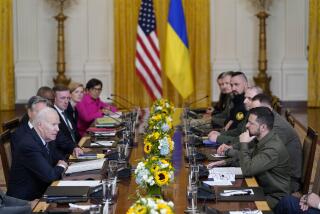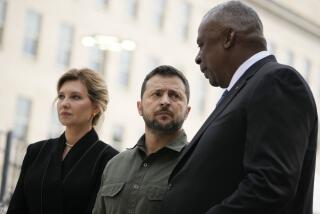U.S. Official Says Philippine Army Needs More Help
- Share via
WASHINGTON — A top State Department official recommended Sunday that the United States provide more aid to help the government of Philippine President Corazon Aquino deal with a Communist insurgency and to head off further attempted military coups.
Michael H. Armacost, under secretary of state for political affairs, said during an appearance on NBC’s televised “Meet the Press” that funds are needed to strengthen the Philippine army to “go after the insurgency in a very comprehensive way.”
While Aquino heads a legitimate government that is carrying out a promising economic program, he said, “she’s been reluctant to commit the army until there was evidence they would take on this job in a retrained and disciplined way.”
An informed official who asked to remain anonymous said that such aid would be in addition to $50 million already appropriated and another $50 million tentatively approved last week by the Office of Management and Budget shortly before forces loyal to Aquino put down a bloody mutiny by rebellious troops.
“I think the evidence of divisions within the military makes clear why it was probably not prudent to unleash the military right away,” Armacost said. “But it’s clear they’re going to have to go after the (Communist) cadres, and for that you need a strong and united military.”
The army inherited by the Aquino government after the popular uprising 18 months ago that ousted then-President Ferdinand E. Marcos “was limited in its capacity to move--it had limited communications, needed retraining,” Armacost said, and the United States “felt it was very important to demonstrate a willingness to help.”
Armacost described last week’s coup attempt as “an extra-constitutional action against the democratically elected authority” and voiced hope that the bloodshed that accompanied it will shock Filipinos into ending insurrectionary activity.
If a coup against an elected democratic regime succeeds, Armacost said, “under our law, we’re obliged to suspend aid.” Asked if he meant that a successful coup would lead to an aid cutoff, he said “we would have to look at the details . . . but the law prescribes it.”
Philippine Vice President Salvador Laurel, in a telephone interview from Manila on the same program, said he talked Saturday with Aquino and proposed creation of a special panel to look into the problems of the military, which range from a breakdown in morale at all levels to corruption and difficulties with organization and equipment.
In another telephone conversation from Manila, Juan Ponce Enrile, an opposition Philippine senator who was fired last year as the nation’s defense minister, said he sees continuing problems in the Philippine military organization “and up to this time, I don’t think they have repaired the problem.”
Enrile also denied any involvement in the attempted coup. He said he stayed home all day while loyalist troops battled rebels in the streets and received a telephone call from Philip Kaplan, former deputy chief of the U.S. mission in Manila, asking him to make a statement of support for Aquino. Enrile said he declined because Kaplan “was not the proper person to ask my assistance.”
Armacost seemed skeptical about Enrile’s denial. He noted that the leader of the coup attempt, Col. Gregorio (Gringo) Honasan, was “very close” to Enrile and called it “clear that he (Enrile) may have hoped they succeeded and expected perhaps to be the beneficiary of their actions.” But Armacost said he has “no hard evidence” to support this suspicion.
More to Read
Sign up for Essential California
The most important California stories and recommendations in your inbox every morning.
You may occasionally receive promotional content from the Los Angeles Times.












